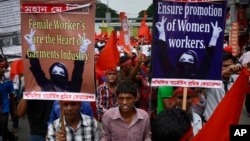LONDON —
The European Union may make changes to its trade agreement with Bangladesh after last week's factory collapse on the outskirts of Dhaka, which left more than 400 people dead.
The EU says it will take "appropriate action" to encourage improved working conditions in Bangladesh factories. EU foreign policy chief Catherine Ashton and Trade Commissioner Karel de Gucht made the comments in a joint statement late Tuesday.
“As Bangladesh’s largest trade partner, the European Union is very concerned about the labor conditions, including health and safety provisions, which are established for workers in factories across the country," said Sébastien Brabant, an Ashton spokesperson.
The textiles industry in Bangladesh is valued at almost $20 billion a year. Europe is Bangladesh’s largest trade partner and 60 percent of its garments are sent to the continent.
The statement called on Bangladeshi authorities to ensure that the country’s factories comply with international labor standards. It said the EU will be considering “appropriate action,” including through the Generalized System of Preferences, which gives Bangladesh duty-free and quota-free access to the EU market.
"Europe wants to encourage improvements in Bangladesh," said Braband. “This is in order to incentivize responsible management of supply chains involving developing countries.”
The factory collapse isn't the only recent disaster in the industry. Last November, more than 100 people died in a fire at a factory in Dhaka.
According to a report published late last year by the Washington D.C.-based campaign group International Labor Rights Forum, more than 1,000 workers have died in Bangladesh in unsafe work environments since 1990.
While pushing Bangladeshi authorities to establish better safety measures, the EU also expects more from international companies, Brabant said.
“And at the same time, we continue to encourage European and international companies to promote better health and safety standards in garment factories in Bangladesh in line with internationally recognized Corporate Social Responsibility guidelines," he said.
Some Western brands were manufactured at the factory that collapsed. Britain's low-cost retailer Primark has offered to compensate victims.
The EU says it will take "appropriate action" to encourage improved working conditions in Bangladesh factories. EU foreign policy chief Catherine Ashton and Trade Commissioner Karel de Gucht made the comments in a joint statement late Tuesday.
“As Bangladesh’s largest trade partner, the European Union is very concerned about the labor conditions, including health and safety provisions, which are established for workers in factories across the country," said Sébastien Brabant, an Ashton spokesperson.
The textiles industry in Bangladesh is valued at almost $20 billion a year. Europe is Bangladesh’s largest trade partner and 60 percent of its garments are sent to the continent.
The statement called on Bangladeshi authorities to ensure that the country’s factories comply with international labor standards. It said the EU will be considering “appropriate action,” including through the Generalized System of Preferences, which gives Bangladesh duty-free and quota-free access to the EU market.
"Europe wants to encourage improvements in Bangladesh," said Braband. “This is in order to incentivize responsible management of supply chains involving developing countries.”
The factory collapse isn't the only recent disaster in the industry. Last November, more than 100 people died in a fire at a factory in Dhaka.
According to a report published late last year by the Washington D.C.-based campaign group International Labor Rights Forum, more than 1,000 workers have died in Bangladesh in unsafe work environments since 1990.
While pushing Bangladeshi authorities to establish better safety measures, the EU also expects more from international companies, Brabant said.
“And at the same time, we continue to encourage European and international companies to promote better health and safety standards in garment factories in Bangladesh in line with internationally recognized Corporate Social Responsibility guidelines," he said.
Some Western brands were manufactured at the factory that collapsed. Britain's low-cost retailer Primark has offered to compensate victims.







